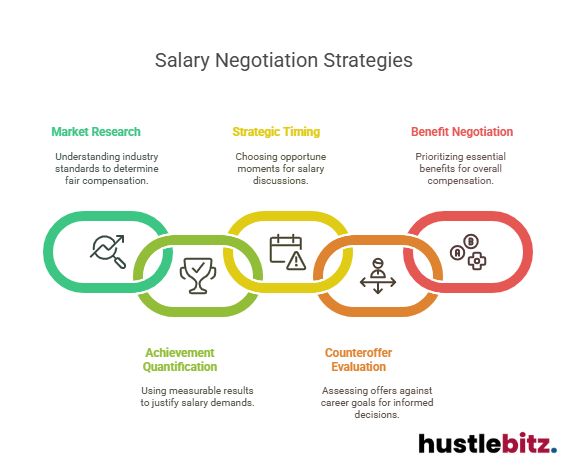Mastering salary discussions and benefits packages involves understanding your market value, researching industry compensation trends, and preparing your case with quantifiable achievements. It’s essential to time your request strategically, considering company performance and personal milestones. Effective communication and emotional intelligence can enhance negotiation dynamics, while handling counteroffers professionally ensures informed decision-making. Additionally, negotiating for comprehensive benefits like health insurance, retirement plans, and work-life balance perks further solidifies your compensation package. To truly become adept at these negotiations, one must also appreciate the significance of non-monetary perks and their impact on overall job satisfaction.
Key Takeaways
- Research Market Value: Know your worth by researching industry salary benchmarks and compensation trends.
- Quantify Achievements: Use specific, measurable accomplishments to strengthen your negotiation position.
- Timing Matters: Choose optimal moments, like performance reviews or after major achievements, for salary discussions.
- Evaluate Counteroffers: Assess all offers thoroughly, considering both immediate and long-term career goals.
- Negotiate Benefits: Prioritize critical benefits like health insurance, retirement plans, and work-life balance perks.

Understanding Your Market Value
Understanding your market value is the cornerstone of successful salary negotiations. Knowing what you bring to the table and how it aligns with industry standards can significantly enhance your bargaining power. The initial step involves deploying effective self-assessment strategies. This requires a thorough evaluation of your skills, experiences, and achievements.
Take stock of your professional qualifications and critically assess how they contribute to your potential employer’s goals.
Industry benchmarks serve as a vital reference point in this process. They provide a realistic framework for what comparable roles in your field command in terms of compensation. Utilize reliable sources such as industry reports, professional associations, and salary surveys to gather accurate data.
This data not only informs your expectations but also equips you with concrete figures during negotiations.
Peer comparisons can further refine your understanding of market value. Engaging in discussions with colleagues and mentors who occupy similar roles can offer invaluable insights. These conversations can help you gauge whether your salary expectations are in line with those of your peers, thereby providing additional validation for your claims.
A meticulous skill evaluation is essential in this context. Identify your core competencies and how they differentiate you from other candidates. Highlighting specialized skills that are in high demand can justify a higher salary.
Documenting specific achievements and quantifying your contributions can also strengthen your position.
Researching Compensation Trends

Building on a solid grasp of your market value, the next step involves a thorough investigation into current compensation trends. This research is indispensable for mastering salary discussions, as it provides concrete data to support your negotiation strategy.
To begin, one should delve into several key areas to ensure a comprehensive understanding.
- Industry Salary Surveys: These are essential tools that offer insights into average salaries within your sector. They compile data from multiple sources, reflecting a broad spectrum of compensation packages. Utilizing these surveys allows you to identify median salaries and understand where you stand in comparison.
- Cost of Living: Geographic salary differences are pivotal, as the cost of living can significantly impact salary expectations. For instance, a role in San Francisco may offer a higher salary than the same position in a smaller city due to the higher living expenses. Tools such as cost of living calculators can be instrumental in making these assessments.
- Competitor Analysis: Examining what competitors are offering for similar roles can provide a strategic edge. This involves looking into job listings, annual reports, and even networking with industry peers to gather relevant data. Understanding your competitors’ compensation strategies helps in setting realistic and competitive expectations.
- Job Role Benchmarks: Establishing benchmarks for specific job roles is crucial. This entails comparing job descriptions and responsibilities across different organizations to ensure that the salary you are aiming for aligns with industry standards. Resources like professional associations and job boards can be valuable for this purpose.
Preparing Your Case

Crafting a compelling case for your desired salary is a critical step in the negotiation process. Building confidence is paramount; this begins with thorough preparation and understanding your worth. Start by gathering quantifiable achievements from your professional history, emphasizing how your contributions have positively impacted prior employers. This will not only bolster your self-assurance but also provide concrete evidence to support your request.
Effective communication is essential in conveying your salary expectations. Develop a clear, concise narrative that aligns your skills and accomplishments with the company’s objectives. This narrative should be practiced extensively through role playing scenarios, which can help simulate the actual negotiation environment. Engaging in these scenarios with a trusted colleague or mentor can refine your delivery, ensuring you articulate your points with clarity and poise.
Emotional intelligence plays a crucial role in preparing for salary discussions. Understanding and managing your emotions, as well as recognizing the emotions of your counterpart, can facilitate a more productive dialogue. This awareness allows you to remain composed and responsive, rather than reactive, during the negotiation.
Active listening is another vital component. It involves fully concentrating, understanding, and responding thoughtfully to your counterpart’s statements. This practice not only demonstrates respect but also provides valuable insights into the employer’s perspective, enabling you to adapt your approach as needed.
Timing Your Request

Having meticulously prepared your case, the next step involves strategically determining when to present your salary request. Timing strategies play a crucial role in ensuring your proposal is received favorably. Identifying optimal moments requires a keen understanding of both industry benchmarks and personal circumstances.
- Annual Performance Reviews: One of the most opportune times to discuss salary adjustments is during your annual performance review. This is when your achievements and contributions are fresh in the minds of decision-makers, providing a solid foundation for your request.
- Company Financial Health: Aligning your request with periods when the company is performing well financially can significantly bolster your chances. When the organization is thriving, budgets are more flexible, and management might be more open to recognizing and rewarding valuable employees.
- Industry Trends: Keeping an eye on industry benchmarks can guide you in choosing the right moment. If the industry is experiencing growth or there are reports indicating a trend of salary increases in your field, leveraging these insights can strengthen your position.
- Personal Circumstances: Your own career milestones and achievements should also dictate timing. For instance, after successfully completing a major project or receiving a noteworthy accolade, your negotiation confidence will be at its peak, making it an ideal moment to initiate the conversation.
Mastering the art of timing your request not only demonstrates your awareness of the broader organizational and industry context but also reflects your strategic thinking.
Handling Counteroffers

Navigating counteroffers effectively is a crucial component of salary negotiations. Mastering counteroffer strategies begins with a thorough evaluation of the initial offer and any subsequent counteroffers. Scrutinize each offer meticulously, weighing factors such as base salary, job responsibilities, and long-term career prospects. This analytical approach enables a well-informed decision-making process, ensuring that your acceptance or rejection is grounded in informed reasoning.
Maintaining professionalism throughout this process is paramount. Counteroffers often lead to heightened emotions and stress, but it is essential to remain composed and courteous. Professionalism signals to your prospective employer that you are a serious candidate who values the negotiation process. This demeanor can significantly influence the employer’s perception and potentially result in more favorable terms.
Communicating effectively is another cornerstone. Clear, concise communication helps in conveying your expectations and rationales. When responding to a counteroffer, articulate your thoughts coherently and substantiate your stance with relevant data or market research. This not only reinforces your position but also demonstrates your negotiation skills and industry knowledge.
Ultimately, making decisions in the context of counteroffers requires balancing immediate financial gains with long-term career goals. Reflect on how each offer aligns with your professional aspirations and personal circumstances. If necessary, seek advice from mentors or industry professionals to gain additional perspectives.
Negotiating Benefits
While mastering counteroffers is a significant aspect of salary negotiations, another critical element that warrants attention is negotiating benefits. Navigating the complexities of benefits packages can significantly impact your overall compensation and work-life balance. To achieve mastery in this domain, consider the following strategic approach.
First, benefit prioritization is essential. Evaluate what matters most to you and aligns with your long-term goals. Whether it’s comprehensive health insurance, a robust retirement plan, or ample vacation policies, understanding your priorities will guide the negotiation process effectively.
Second, health insurance is often a cornerstone of benefits packages. Analyze the offerings carefully, considering factors such as premium costs, coverage extent, and out-of-pocket expenses. Ensuring that the health insurance plan meets your needs can provide substantial peace of mind and financial security.
Third, retirement plans are critical for long-term financial stability. Assess the employer’s contributions to 401(k) or similar retirement accounts. Negotiating for higher matching contributions
or additional retirement benefits can significantly enhance your future financial security.
Fourth, vacation policies and remote work options play a crucial role in maintaining a healthy work-life balance. Negotiating for additional vacation days or flexible remote work arrangements can enhance job satisfaction and productivity.
These benefits can be particularly valuable in ensuring that you have the necessary time and flexibility to manage personal responsibilities and recharge.
To navigate these negotiations successfully, approach each benefit with clarity and confidence, ensuring that your package aligns with both your immediate needs and long-term aspirations.
Leveraging Non-Monetary Perks

Non-monetary perks can be powerful tools in salary negotiations, often providing substantial value that goes beyond the paycheck. Understanding and leveraging these perks can significantly enhance one’s overall compensation package while addressing personal and professional needs.
One of the most sought-after non-monetary perks is the ability to maintain a healthy work-life balance. This can be achieved through flexible hours, which allow employees to tailor their work schedules around personal commitments. Flexible hours not only increase job satisfaction but also boost productivity, making it a win-win for both employee and employer.
Another invaluable perk is professional development opportunities. Investing in continuous learning and skill enhancement can have long-term benefits for an employee’s career trajectory. Employers who offer access to workshops, courses, and certifications demonstrate a commitment to their workers’ growth, which can be just as appealing as a higher salary.
Remote work options have gained immense popularity, particularly in recent years. The ability to work from home, or anywhere, provides employees with greater autonomy and reduces commuting time and expenses. This perk can be a significant bargaining chip during salary negotiations, especially for roles that do not require a constant physical presence in the office.
Wellness programs are another attractive non-monetary benefit. Companies that offer gym memberships, mental health support, and wellness initiatives show that they prioritize their employees’ overall well-being.
These programs can lead to improved employee morale and reduced healthcare costs, making them a smart inclusion in any benefits package.
Final Thoughts
Mastering salary discussions and benefits negotiations is crucial to ensuring your compensation reflects your true value. By understanding your market worth, preparing a strong case with quantifiable achievements, and strategically timing your requests, you can confidently navigate these conversations. Beyond salary, don’t overlook the significance of benefits packages and non-monetary perks, which can greatly enhance your overall job satisfaction and work-life balance. Whether it’s healthcare, retirement plans, or professional development opportunities, a well-rounded approach to negotiation ensures that you secure the best possible outcome for your career and well-being.




